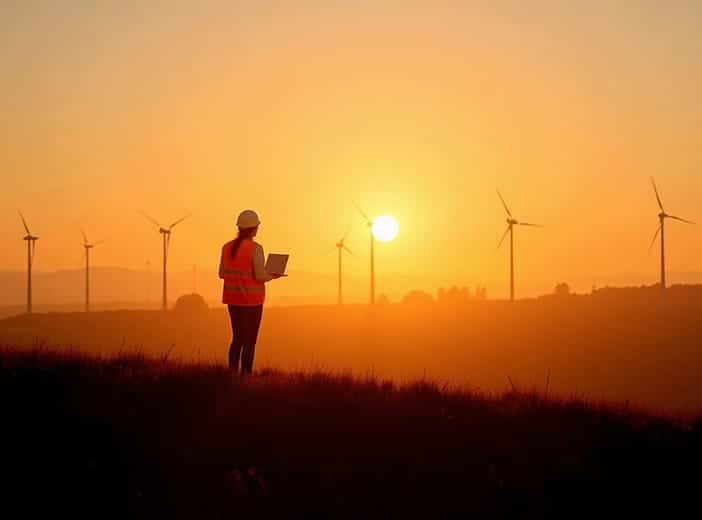The importance of sharing energy data beyond the sector
Increasing energy data usage drives greater efficiency, collaboration and innovation within utilities themselves, and across the entire sector. However, sharing data more widely with other stakeholders, from local government to start-ups enables true data democratization and offers even deeper benefits for individual organizations and society as a whole.

Utilities across the globe are seeing the benefits of embracing data sharing. Collecting and sharing data internally between teams increases digitization, improves efficiency and enables closer collaboration. Opening data up to other industry partners allows greater transparency and better management of wider operations as the sector transforms through the shift away from fossil fuels.
What is now happening is that leading utilities are taking data sharing a step further. They are sharing it outside the sector and with non-traditional partners to deepen its impact and create totally new use cases. This true data democratization puts information at the heart of wider ecosystems, driving decarbonization and meeting societal and environmental challenges.
Taking energy data sharing to the next level
Based on the experiences of our customers and the wider energy sector there are six key audiences that can benefit from sharing utility data, either through open data or the creation of new data services:
Local government stakeholders
Building a Net Zero world takes careful planning. For example, there needs to be sufficient charging points to encourage electric vehicle adoption, while energy inefficient housing stock needs to be identified and updated. Sharing usage data with local government provides them with the ability to plan operations with greater certainty and granularity, targeting their efforts to where they will deliver real results.
For example, French electricity distributor Enedis aims to be proactive in meeting the needs of local government stakeholders. Recognizing that they are not data experts, it has created dedicated ways that they can log on and easily visualize and reuse energy data about their specific town, city or region. This allows them to explore key energy data and use it to measure their own progress towards Net Zero and easily compare their efforts against other areas.
Academics and researchers
Modeling and understanding the changes in the energy market is vital to accelerating decarbonization. Many researchers and academics are therefore dedicating their time to investigating the current picture of energy use, as well as predicting future trends that will impact us all, especially around climate change. Their work relies on accurate, up-to-date information that can be easily accessed and added to their models.
Utility data is extremely valuable to creating understanding. Portuguese energy distributor E-REDES collaborates extensively with universities, creating a dedicated thematic page to meet their needs. This enables data experts to easily access and download open datasets, including the amount of power consumed, broken down by postcode and the number of new EV charging points added to the network on a monthly basis. Data can be explored, analyzed and automatically downloaded through APIs.
Companies developing new buildings and new renewable energy sources
New building developments (such as business parks or housing estates), and renewable generation sources, such as wind and solar farms require significant investment. That means the companies developing them need to plan to ensure they are in the best possible locations in order to connect seamlessly to the energy distribution grid, without requiring significant upgrades to infrastructure. Being able to see visually where existing and planned network assets are located therefore helps building and energy developers make more informed investments that benefit everyone.
UK Power Networks’ (UKPN’s) open data portal includes its Distribution Future Energy Scenarios (DFES). This shows four separate ‘scenario worlds’ of what network and energy needs could look like in 2050. Alongside data on current network usage this allows developers to plan better and contribute to the Net Zero future. UKPN is now going further, sharing data on substation location and the noise levels they produce. Developers can therefore work with the utility to minimize any noise impacts on their building developments, early in the process.
Start-ups and new players
Utilities understand that they do not have all the answers when it comes to better using their data. Innovative new use cases can come from start-ups, companies outside the industry and individuals. Sharing information widely is therefore crucial to generating new ideas and new perspectives.
Energias de Portugal (EDP) has committed to generate 80% of the country’s electricity from renewables by 2030. This requires new approaches to managing the network, given the intermittent nature of renewable power. As part of this strategy its innovation division collects and shares data from sensor networks distributed throughout its energy production facilities. To stimulate greater use of this data EDP organizes regular challenges and hackathons with prizes, thus motivating its community to create innovative solutions to accelerate the energy transition.
Sharing with consumers
Providing consumers and citizens with energy data through easily understandable maps and visualizations brings greater transparency and builds trust. However, utilities can go even further, unlocking energy data to help consumers to decarbonize. For example, with the consumer’s permission personal energy usage information can be shared with third-parties. It could be used by banks to enable them to provide loans for sustainability renovations, builders to allow them to run an energy/sustainability audit or companies offering predictive maintenance of EV batteries.
Data sharing with consumers also enables utilities to demonstrate their progress towards decarbonization. Energy group EDF’s open data portal includes a section devoted to the organization’s extra-financial and corporate social responsibility (CSR) commitments.
The portal provides ways to track CSR performance for indicators such as responsible development, carbon and climate neutrality, and resource preservation.
Sharing with partners
Data democratization enables organizations to better engage their partners and collaborate to create new innovative products and services. This co-innovation enables organizations to work together, powered by data, to solve today’s complex challenges around sustainability and decarbonization.
This sharing can be underpinned by data services, which combine datasets and the tools needed to analyze, understand and integrate information in a complete package. Creating and sharing data services through a central marketplace provides partners with the ability to easily collaborate and innovate, while potentially creating new revenue streams.
Schneider Electric is a leading provider of digital energy and automation solutions for efficiency and sustainability. It created its Exchange data services marketplace to share data between players in the energy sector and beyond. Partners in the ecosystem can also share ideas and concepts through a powerful collaborative cloud platform and access a network of solution providers in the energy sector. One example is a data service that enables organizations to easily collect Internet of Things (IoT) data from sensors (such as temperature, and air quality) in order to reuse them to optimize energy management. Read more on Schneider Electric’s work in this blog.
Industry initiatives to encourage sharing
We are now seeing an increased focus on data sharing across industries and sectors. The perfect example of this is the new Industry Data for Society Partnership, which aims to put data to work to benefit people around the world. Its seven founder members include utilities UK Power Networks and Northumbrian Water Group, along with R2 (part of Rolls-Royce), Microsoft, GitHub, Hewlett Packard Enterprise and LinkedIn.
One of its first projects is to launch a ‘Data for Local Environments Challenge’ with affiliate member the Open Data Institute. This will look to explore how public and private datasets can be used to improve city and other local environments, such as reaching their Net Zero goals.
Data democratization is crucial to better understanding and solving a wide range of pressing issues, from better use of resources to decarbonization. Given its central position in the economy, utilities are well-placed to drive – and benefit from – increased data sharing with a wide range of stakeholders inside and outside the sector.




